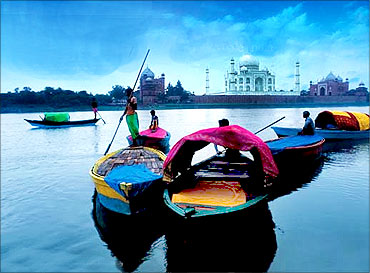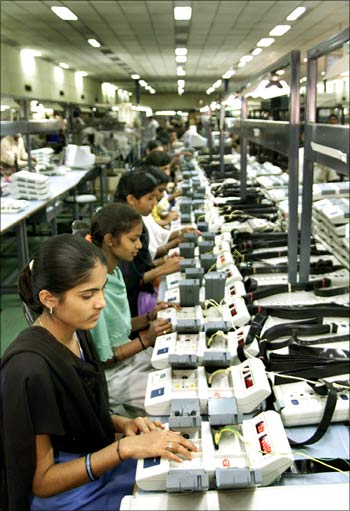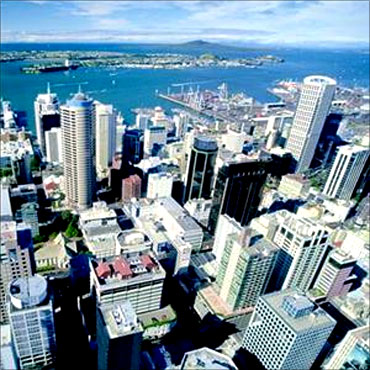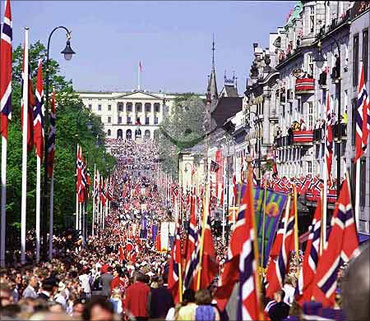Photographs: Courtesy, Ministry of Tourism.
For a nation that prides itself on jugaad, the North Indianism for spunky innovativeness and lateral thinking, it can't be comforting to find it has slipped in the global innovation index.
How far India has gone down in the Insead-CII innovation index is difficult to say since this year's rank of 56 out of 130 countries compares with last year's 43rd position out of 107 countries. For the record, China is also down six places, though at 43rd, it is ranked above India. Equally, it can be no one's case the index is flawless.
The fact that a report on innovation should give equal weights to political stability as it does to protection of intellectual property or to the number of researchers in R&D per million population is surely problematic.
Similarly, while the report suggests India's education system is doing better than China's, the World Bank's Knowledge Assessment Methodology (KAM) indicates quite the reverse - indeed, not only does India fare worse than China on the KAM indices, it is one of the few countries that has slipped vis-a-vis itself once the raw results are weighted, as they should be, by the population in the country between now and 1995 when the index was first created.
This, of course, should caution researchers not to draw conclusions by comparing across different type of samples. Keeping these limitations in mind, a few broad points can be made.
One, India remains very far behind China not just in terms of the old-style physical infrastructure of roads and power output, the difference is very stark when it comes to the information and communications technology sector - while Insead-CII ranks India and China as 108th and 71st in the world, their World Bank KAM scores are 2.49 and 4.33, respectively.
...
Inputs: Business Standard, Agencies
Innovation? India ranks 56th in the world
Image: India spends less on research.Photographs: Reuters
That India should have created the licensing mess it has in the telecom sector, and has already delayed the 3G spectrum auctions by more than a year, can only add to the problem - given how mobile phones outstrip computers so dramatically, future broadband penetration is critically dependent upon the rollout of 3G and Broadband Wireless Access licences.
Two, thanks to the much lower levels of R&D spend - India is 36th compared to China's 23rd rank when it comes to company spending on R&D, and 41st compared to China's 24th rank for public spending on R&D.
India ranks much lower when it comes to patents, labour productivity, value addition or the share of high-tech exports in total exports of the manufacturing sector. India is a resource-deficient economy on a per capita basis.
If India's future GDP growth has to be sustained and India has to overcome this resource deficiency, and given that natural resources are increasingly scarce and global warming so critical, a low innovation score will prove to be a serious handicap.
India needs organised effort and adequate investment, both in the public and private sector, to improve productivity of land, labour and capital, and, thereby, its competitiveness. Serendipity or jugaad will not suffice.
Check out the nations which topped the global innovation list...
Innovation? India ranks 56th in the world
Image: An aerial picture shows part of Europe's biggest glacier Vatnajokull, in south-eastern Iceland.Photographs: Stoyan Nenov/Reuters.
Innovation has proved to be a key enabler of progress and competitiveness; especially in times when the world is recovering from the aftershocks of a global recession.
Iceland has topped the global innovation list despite the tough economic situation it has faced since two years, according to the Global Innovation Index and Report launched by INSEAD in partnership with Confederation of Indian Industry (CII).
The report has stressed the importance of innovation in country competitiveness and development strategies and has provided a very useful tool for decision makers and civil society alike to monitor national progress.
Among the best innovators from last year, USA (11th), UK (14th), Germany (16th) have fallen in ranks. One of the most important lessons learnt is about the extraordinary capacity of innovation to drive growth since it can play a critical role not only in facilitating countries' recovery but also in sustaining national competitiveness in the medium to long term, says the report. The GII 2009 2010 covers a record number of 132 economies.
1. Iceland
Thanks to its innovative spirit, Iceland has recovered from its deep recessionary state, says the report. Iceland has started putting in place innovative processes and structures to deal with the crisis proactively.
The country has switched to a New Age knowledge economy and it has used green technology both in terms of geothermal energy as well as adopting hydrogen as a fuel for cars. Iceland's scores high on infrastructure and ICT, human capacity, innovation potential and investment in education.
Innovation? India ranks 56th in the world
Image: A Sweden fan before the country's soccer match against Spain.Photographs: Alexandra Beier/Reuters
It comes second in terms of ICT and infrastructure and notches a third position in the human capacity and creative output. In the science output, Sweden is ranked at seventh position.
Innovation? India ranks 56th in the world
Image: Teenagers play computer games in a Hong Kong Internet cafe.Photographs: Kin Cheung/Reuters.
Hong Kong ranks first in creative output and second in market sophistication and third in institutions.
Hong Kong is one of the leading financial centres in the world and has been ranked as the freest in the world by the Index of Economic Freedom for 15 consecutive years.
Innovation? India ranks 56th in the world
Image: Traditionally dressed men take part in flag tossing during Switzerland's holiday celebrations.Photographs: Arnd Wiegmann/Reuters
The Netherlands, Denmark, Sweden, Singapore and Switzerland are the only economies that continue their positions as the top ten innovators compared to last year.
The quality of education institutions is an important indicator here of the overall human capacity of a country which in turn affects the innovation capabilities of a nation, says the GII report.
With its stable economic policies, world class educational institutes, highly skilled work force, Switzerland has one of the highest per capita GDP figures and a booming tourism Switzerland scores high on creative output and social well being.
Innovation? India ranks 56th in the world
Image: Danish economy has the lowest income inequality.The modern market economy has a high tech agricultural sector, up-to-date small scale industry, world class universities, comfortable living standards, and extensive social welfare policies.
The Danish economy has the lowest income inequality and one of the highest tax rates in the world making it a welfare state.
Innovation? India ranks 56th in the world
Image: A child slides on snow in front of the Santa Claus' Office in Santa Claus' Village.Photographs: Kacper Pempel/Reuters.
Finland is a highly industrialised economy with a huge service sector and has been one of the key centres of research in science and technology.
The country scores high on innovation ecosystem, tops in human capacity, ICT, business sophistication, intellectual property protection and effective government.
Innovation? India ranks 56th in the world
Image: Singapore's financial district.Photographs: Vivek Prakash/Reuters
Singapore is a byword for self-creation and self-determination among modern nation states.
Through an enlightened governance system, it has created itself over the past 40- plus years, transforming a small island with only the resources of its people into a global city-state that is a model of economic success, social unity, educational superiority and technological achievement, says the GII report.
Innovation in its various forms has played a key role in this transformation. Singapore has a highly developed and successful free-market economy, enjoying a remarkably open and corruption-free environment, stable prices, and a per capita GDP higher than that of many of the Western developed countries.
Innovation? India ranks 56th in the world
Image: A businessmen surfs the net.Photographs: Reuters
The Netherlands scores high on ICT and infrastructure, quality of education and scientific research, legal framework, intellectual property protection and market sophistication.
Innovation? India ranks 56th in the world
Image: New Zealand promotes entrepreneurship and innovation.9. New Zealand
New Zealand ranks first in new business ownership rate. The government of New Zealand has tried to kick start a number of innovation initiatives to boost the economy, says the GII report.New Zealand has a rich pool of creative and commercially minded scientists with world-class research and development facilities. It has steadily inched up in the innovative sphere by providing a stable business environment for business with research and development costs of 50 per cent lower than in Europe and the United States.
Growing the biotechnology venture capital market actively supported by the government has brought in rich dividends for the nation. New Zealand is ideal for promoting local entrepreneurship and innovation. Research and development is 100 per cent tax deductible and it has an IP regime that protects investment.
Innovation? India ranks 56th in the world
Image: Norway is 10th in the innovation index.Norway scores high in political stability, government effectiveness, venture capital availability and number of researchers.
The report highlights that the country leaders of today are not necessarily the leaders of tomorrow. Innovation can therefore - and often must - be disruptive to catalyse the process.













article